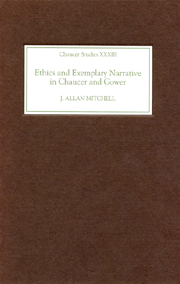Book contents
- Frontmatter
- Contents
- Acknowledgements
- Abbreviations
- Introduction
- 1 Reading for the Moral: Controversies and Trajectories
- 2 Rhetorical Reason: Cases, Conscience, and Circumstances
- 3 Gower For Example: Confessio Amantis and the Measure of the Case
- 4 All That Is Written For Our Doctrine: Proof, Remembrance, Conscience
- 5 Moral Chaucer: Ethics of Exemplarity in the Canterbury Tales
- 6 Pointing the Moral: The Friar, Summoner, and Pardoner's Satire
- 7 Griselda and the Question of Ethical Monstrosity
- Conclusion
- Bibliography
- Index
- CHAUCER STUDIES
4 - All That Is Written For Our Doctrine: Proof, Remembrance, Conscience
Published online by Cambridge University Press: 12 September 2012
- Frontmatter
- Contents
- Acknowledgements
- Abbreviations
- Introduction
- 1 Reading for the Moral: Controversies and Trajectories
- 2 Rhetorical Reason: Cases, Conscience, and Circumstances
- 3 Gower For Example: Confessio Amantis and the Measure of the Case
- 4 All That Is Written For Our Doctrine: Proof, Remembrance, Conscience
- 5 Moral Chaucer: Ethics of Exemplarity in the Canterbury Tales
- 6 Pointing the Moral: The Friar, Summoner, and Pardoner's Satire
- 7 Griselda and the Question of Ethical Monstrosity
- Conclusion
- Bibliography
- Index
- CHAUCER STUDIES
Summary
Gower would seem to couch the Confessio Amantis in the academic terms of compilatio, a word which has taken on great weight in recent critical discussion of the poem and its exemplary import. In a marginal gloss the author says that despite poor health he diligently compiled (studiosissime compliauit) the poem, set tanquam fauum ex floribus recollectum,…ex variis cronicis, histories, poetarum philosophorumque dictis [like a honeycomb gathered from various flowers,… from various chronicles, histories, and sayings of the poets and philosophers] (Prol., at 34*). Gower's long poem is thus an expressly inclusive collection, akin to a gathering of the best that has been known and thought in the Middle Ages, and not unlike an antique florilegium which is arguably the origin of later compilations. The horticultural analogy, which I will return to later, is important to notice. But as a collection of narrative exempla, the Confessio also has great affinity with preachers' example-books, such as the Alphabetum Narrationum or the Speculum Laicorum, as well as with the penitential handbooks, like Robert Mannyng of Brunne's Handlyng Synne, among other various compilations of moralized stories.
In the last chapter I argued that the reader might profitably approach Gower's large compilation as though it contained “all that is written for our doctrine” – an array of moral stories meant for our goodness, without presupposing them all to be true. And I claimed that my ethical reading has the advantage of enabling the audience to make sense of incongruity within or between exempla in the compilatory array, so that the patent contradictions and copiousness of the work need not necessarily be seen as a failure of moral rhetoric.
- Type
- Chapter
- Information
- Ethics and Exemplary Narrative in Chaucer and Gower , pp. 61 - 78Publisher: Boydell & BrewerPrint publication year: 2004



